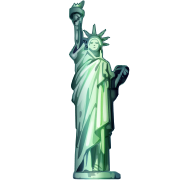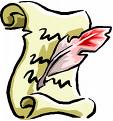

 Ever Upward
Ever Upward



 Ever Upward
Ever Upward

New York is special.
New York is diff'rent' cause there's no place else
On earth quite like New York
from I Love New York by Steve Karmen










New York,1846, Preamble.
We The People of the State of New York, grateful to Almighty God for our Freedom, in order to secure its blessings, do establish this constitution.
Be of good courage, and he shall strengthen your heart, all ye that hope in the LORD.
Psalm 31:24










Institution of Higher
Learning
Religion is the solid basis of good morals; therefore education should teach the precepts of religion, and the duties of man toward God.
Gouverneur Morris who signed the Constitution and wrote two commentaries on the Constitution.
1754 King's College (later Columbia) founded by New York City Anglicans, after conceding role to Presbyterians. "In thy light we shall see light."
King's College: Received its charter from King George II in 1754. Located in New York City on land provided by Trinity Church, King's was the fifth of nine colonial colleges. Its charter came between that of the College of New Jersey (later, Princeton) in 1746 and the College of Philadelphia (later, the University of Pennsylvania) in 1755. Harvard, William & Mary, and Yale had already been established; Brown, Rutgers, and Dartmouth were to follow. King's was the smallest and richest of the colonial colleges. Reverend Samuel Johnson, a colonial scholar and Anglican minister, was appointed its first president. Johnson held the first classes in a school house that was adjoined with Trinity Church.
In the summer of 1774, the life of the college's president (Myles Cooper) was threatened by a revolutionary mob because of his loyalist sympathies. The college was soon shut down and remained so throughout the Revolutionary War as the city was occupied by the British. John Jay and Alexander Hamilton were instrumental in the college's reopening in 1784 with a new charter as Columbia College. Governor George Clinton was chancellor and his son DeWitt Clinton was a transfer from Princeton to become the renewed college's first student. Also among the earliest students and Trustees of the college were Gouverneur Morris who drafted the U.S. Constitution, and Robert R. Livingston, part of the committee to draft the Declaration of Independence.
A subsequent charter in 1785 specified it as "Columbia College in the City of New York." Taken from Columbia's home page website
Note: Philip Livingston was also prominent in the establishment of King's college.
http://www.nysl.nysed.gov/emblems/bird.htm
From early governing documents:
|
"THAT Noe person or persons
which professe ffaith in God by Jesus Christ Shall at any time be any wayes
molested punished disquieted or called in Question for any Difference in
opinion or Matter of Religious Concernment" New York
Charter of Liberties and Privileges
1683 "Article XXXVIII. And whereas we are required, by the benevolent principles of the rational liberty, not only to expel civil tyranny, but also to guard against that spiritual oppression and intolerance wherewith the bigotry and ambition of weak and wicked priests and princes have scourged mankind, this convention doth further, in the name and by the authority of the good people of this state, ordain, determine, and desire, that the free exercise and enjoyment of religious profession and worship, without discrimination or preference, shall be forever hereafter be allowed, within this state, to all mankind: PROVIDED That the liberty of conscience, hereby granted, shall not be so construed as to excuse acts of licentiousness, or justify practices inconsistent with the peace or safety of this state. Article XXXIX. And whereas the ministers of the gospel are, by their profession, dedicated to the service of God and the care of souls, and ought not to be diverted from the great duties of their function, therefore, no minister of the gospel, or priest of any denomination whatsoever, shall, at any time hereafter, under and preference or description whatever, be eligible to, or capable of holding, any civil or military office or place within this state." New York Constitution, 1777 |
The early settlers developed colonial charters that were decidedly evangelical in their purpose, often expressing a goal for their colony to advance the Christian religion. As the country progressed up to the revolutionary war period, state constitutions evolved from the charters. Those state constitutions served to maintain the order already established by the original charters, the charters based on Christianity.
....the free exercise and enjoyment of religious profession and worship, without discrimination or preference, shall be forever hereafter be allowed, within this state, to all mankind: PROVIDED That the liberty of conscience, hereby granted, shall not be so construed as to excuse acts of licentiousness, or justify practices inconsistent with the peace or safety of this state.